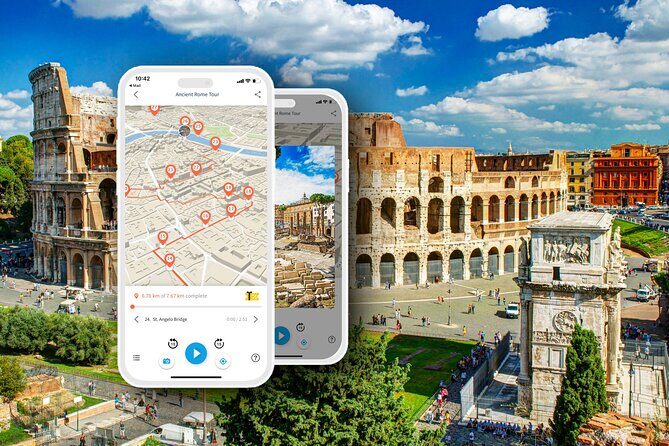A Self-Guided Tour of Ancient Rome: Worth It or Not?
If you’re looking to see some of Rome’s most iconic sites without the hassle of a guided group, the Ancient Rome Walking Tour with Audioguide on Your Smartphone promises a flexible way to explore. For just $8.13 per person and approximately 3.5 hours, you get access to an offline audio guide that takes you from the Colosseum to the Vatican, touching on 27 points of interest.
What sets this tour apart? First, you can go at your own pace, pausing for coffee or wandering into those hidden side streets that make Rome special. Second, the entire experience is designed to be easy to follow—download the app beforehand, and you’re set to go without needing Wi-Fi or a guide physically present.
That said, not everything is perfect. The reviews highlight significant issues with functionality and content quality. One traveler couldn’t get the app to work because of connectivity issues, despite being told it works offline after download. Others found the commentary too brief and lacking depth, with some disliking the voice and background music.
So, this tour might suit those who value flexibility and budget-friendly options, especially if you’re comfortable navigating with a smartphone and don’t mind a minimalist audio experience. If you’re after detailed historical insights or a guided personal touch, other options might better suit your needs.
Key Points

- Affordable Price: For just over $8, you get 27 points of interest with a year’s access.
- Flexibility: Self-paced, with the freedom to pause, explore, and take breaks anytime.
- Offline Access: The app is designed to work offline after download, ideal for Rome’s connectivity spots.
- Limited Depth: The reviews suggest the commentary is brief and sometimes annoying, making it less satisfying for history buffs.
- No Guided Presence: No in-person guide, which means more independence but less personal interaction.
- Variable Experience: Technical issues and content quality may impact the overall value.
Exploring the Route: What You Can Expect at Each Stop

If you're drawn to exploring Rome on foot, we've looked into these other walking experiences
The Colosseum
We love the chance to stand within Rome’s most iconic structure and imagine the gladiator contests and public spectacles once held there. The guide describes the Colosseum as a testament to Roman architectural brilliance, and you’ll walk through its arches, picturing the roar of audiences from nearly 2,000 years ago.
The Arch of Constantine
This triumphal arch, built in 315 AD, is nearby and richly decorated with reliefs. It’s a visual feast that speaks to Roman imperial power. One review pointed out how the reliefs incorporate art from earlier monuments, giving a layered sense of history.
Aqua Claudia
A marvel of Roman water engineering, this aqueduct’s towering arches still inspire admiration. The structure once carried water over 68 kilometers. It’s a reminder of how Romans built for function and durability.
Circus Maximus and Cloaca Maxima
The expansive outline of Circus Maximus sparks the imagination about chariot races and ancient festivals, even if only remnants remain. Nearby, the Cloaca Maxima shows us Roman ingenuity in urban planning—an early sewage system still largely in place.
While in Rome, here are other experiences we've covered
- Colosseum & Ancient Rome: Guided Tour or Audio-Guide Option
- Colosseum, Roman Forum And Palatine Hill Admission With Audio App
- ColosseumWorld: Colosseum Entry Tickets with AI Video Guide App
- Colosseum, Forum, Palatine Hill with Arena Access and Audio Guide
- Colosseum and Roman Forum Group Tour or Self Audio Guided tours
- Angels and Demons of Rome: Illuminati Exploration Game and Tour
Isola Tiberina and the Portico of Octavia
Both sites offer a mix of history and tranquility. Tiberina Island, shaped like a ship, was a place of healing long before modern hospitals. The Portico, restored by Augustus, hints at Rome’s cultural and political vitality in ancient times.
Theatre of Marcellus and Capitoline Hill
The Theatre of Marcellus remains impressive, especially with its elegant arches, now serving as a backdrop to modern Rome. From Capitoline Hill, you get sweeping views of the Roman Forum, and the nearby Temple of Juno Moneta adds a layer of myth and civic importance.
Piazza della Minerva and Pantheon
The charming Piazza hosts Bernini’s Elephant Obelisk, while the Pantheon is an example of Roman engineering mastery—the oculus and the dome remain awe-inspiring. These sites offer both visual delight and deep historical resonance.
Campo de’ Fiori and Piazza Navona
The lively Campo de’ Fiori, with its market and the statue of Giordano Bruno, shows Rome’s layered history and modern vitality. Nearby, Piazza Navona dazzles visitors with Bernini’s Fountain of the Four Rivers and its vibrant street life.
St. Angelo Bridge and Castel Sant’Angelo
The St. Angelo Bridge is famous for Bernini’s angel statues, while Castel Sant’Angelo offers panoramic views and a peek into Rome’s layered past as a mausoleum, fortress, and museum.
Passetto di Borgo and Tomb of Saint Peter
The Passetto is a secret passage linking Vatican City to Castel Sant’Angelo, with a history of papal escape routes. The Tomb of Saint Peter beneath St. Peter’s Basilica is a deeply spiritual and historical site, connecting visitors to early Christianity.
What We Like (and What Raises Eyebrows)
The main advantage of this tour is its cost-effectiveness and flexibility. For $8.13, you gain access to a broad sweep of Rome’s essential sights with a simple mobile app—no need for a guide, just your own curiosity and headphones. The offline functionality is a huge plus, especially in areas where Wi-Fi can be spotty.
However, the reviews warn us that the audio content can be too brief, leaving some feeling they didn’t get enough information. One reviewer called it “rubbish” because of the lack of detail and disliked the voice and background music. Others experienced technical glitches like the app not working because of Wi-Fi issues, despite the promise of offline use.
It’s also worth noting that this experience assumes you’ll be comfortable walking independently and navigating with your phone. If you prefer a guided, in-depth narrative, this might fall short.
Who’s it best for?
Budget travelers who value independence and are comfortable with smartphone navigation will find this a good deal. It’s also suitable for those who want an outline of Rome’s highlights without the expense or schedule constraints of guided tours. But history buffs craving detailed stories or travelers expecting flawless tech might want to look elsewhere.
The Full Breakdown: Detailed Itinerary Analysis

The Colosseum is perhaps the highlight, and rightly so. Standing inside, you can almost hear the shouts of the crowd or imagine the gladiators’ clashes. The tour’s audio, written by a professional historian, aims to bring that feeling to life, though the brevity of commentary might leave you wanting more context.
Just nearby, the Arch of Constantine offers a quick glance at Roman triumphs—a majestic monument that chronicles victory, decorated with reliefs from earlier monuments. While some might expect a detailed history, the guide provides a friendly overview, perfect for a casual walk.
The Aqua Claudia is a reminder of Roman engineering skills, with its towering arches still impressive today. It demonstrates how Romans mastered urban water supply, a feat often overlooked by visitors but fascinating when you see the surviving structures.
The Circus Maximus, once the largest sporting arena, now mainly open ground. Visitors can visualize chariot races, but without much remaining architecture, it’s more about the imagination. The Cloaca Maxima offers a peek into urban sanitation that shaped the city’s development.
Tucking into Isola Tiberina, you get a break from the hustle—this quiet island has been a place of healing since ancient times. The Portico of Octavia further enriches the experience, with ruins hinting at Rome’s cultural scene under Augustus.
The Theatre of Marcellus is a highlight for architecture lovers, showcasing Roman ingenuity in creating spaces for public entertainment. Its preservation allows visitors to walk through history, blending the ancient with the modern.
Capitoline Hill, with the Temple of Jupiter and Piazza designed by Michelangelo, offers sweeping views. The Temple of Juno Moneta ties into Rome’s mythology and civic identity, making it a meaningful stop.
The Pantheon, with its massive dome and oculus, remains one of the most impressive structures from Roman antiquity. It’s a perfect spot for reflection, and many travelers appreciate the calm interior and timeless architecture.
The lively squares of Campo de’ Fiori and Piazza Navona inject energy into the tour. The statue of Giordano Bruno and Bernini’s fountains add layers of history and art, demonstrating Rome’s ability to combine past and present.
Strolling across the St. Angelo Bridge offers splendid city views, while the castle itself is a treasure trove of art and history. The Passetto di Borgo is a fascinating secret passage—adding a touch of intrigue—and the Tomb of Saint Peter provides a spiritual climax to the experience.
Final Thoughts: Who Should Consider This Tour?

This self-guided tour on your smartphone offers a budget-friendly way to get a broad overview of Rome’s most notable sites. It’s suited for independent travelers who enjoy walking at their own pace, especially those comfortable with technology and looking for an affordable, flexible option.
If you’re a history buff seeking detailed narration and an immersive experience, you might find the brief commentary and technical issues disappointing. Conversely, if you want a quick summary of key sites without the typical tour group hustle or hefty price tag, this could be perfect.
Keep in mind, the mixed reviews suggest you should prepare for potential glitches and be ready to supplement the audio guide with your own reading or curiosity. It’s a low-cost, no-frills approach to discovering Rome, and for some, that’s exactly what makes it appealing.
FAQs

Does the tour include an in-person guide?
No, it’s a self-guided experience relying on an app and your own exploration.
How long is the tour?
The estimated duration is approximately 3 hours 30 minutes, depending on your pace and how often you stop.
Can I use the tour without Wi-Fi?
Yes, the app is designed to work offline after you download the content beforehand. However, some users faced issues, so it’s best to fully download the tour prior to arrival.
Is the tour suitable for all ages?
Yes, since there’s no formal guide and it involves walking, it’s suitable for most travelers who enjoy self-guided exploration.
What points of interest are included?
The itinerary covers 27 sites, including the Colosseum, Roman Forum, Pantheon, Piazza Navona, Castel Sant’Angelo, and more.
Are there any extra costs?
Most sites are free to view from outside, but some stops like the Pantheon or museums might have entry fees. The tour itself costs $8.13.
What should I bring?
Bring your own headphones for clear audio, and a fully charged smartphone.
Is this tour good for first-time visitors to Rome?
It offers a broad overview, which can be helpful, but it might lack depth for those wanting detailed historical stories beyond the brief commentary.
Can I customize the route?
Yes, since it’s self-guided, you can choose to linger longer or skip certain sites.
What if I encounter technical issues?
You might find the app doesn’t work as expected, especially if the download wasn’t completed properly. It’s always good to test the app before heading out.
In the end, this tour offers a straightforward way to see many of Rome’s highlights, especially if you prefer independence and a budget-friendly approach. Just be prepared for some potential technical hiccups and brief commentary. It’s best suited for travelers who appreciate flexibility and don’t mind doing a little extra reading or exploring on their own.
More Walking Tours in Rome
More Tours in Rome
More Tour Reviews in Rome
- Rome: Vatican Museum & Sistine Chapel Skip-the-Line Tickets
- Pantheon Private Guided Tour – Rome’s Iconic Ancient Temple
- Hidden Rome Tour: Interactive Walking Quest
- Church of Jesus Christ of Latter Day Saints – Visit Mormon Temple in Rome
- Private transfer from Rome to Sorrento
- Rome: Pub Crawl & Ultimate Party Tour
More Rome experiences we've covered
- Rome’s 15 Top Wine Tours
- Our Picks For The 5 Best Vegan & Vegetarian Tours In Rome
- Our 15 Favorite Rome Lunch Experiences
- The 15 Most Popular Food Tours In Rome
- Rome’s 15 Top Dinner Experiences (With Prices)
- 15 Fantastic Dining Experiences In Rome
- 4 Best Craft Beer Tours In Rome
- Rome’s 3 Best Coffee Tours: Which To Choose?
- 15 Top Workshops & Classes In Rome (With Reviews & Prices)
- 15 Most Highly Rated Walking Tours In Rome
- The 15 Most Popular Tours In Rome
- 6 Most Highly Rated Spa & Hot Springs Experiences In Rome
